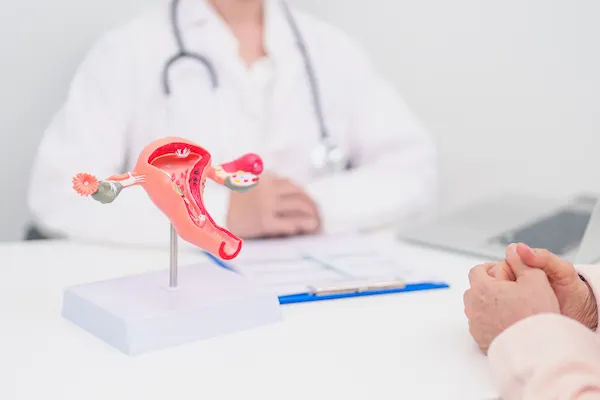Guide to Understanding Polycystic Ovary Syndrome PCOS
Comprehensive guide to understanding Polycystic Ovary Syndrome (PCOS), including symptoms, causes, diagnosis, and treatment options to help manage your health effectively.

Written by Dr. Dhankecha Mayank Dineshbhai
Reviewed by Dr. Vasanthasree Nair MBBS
Last updated on 13th Jan, 2026
.webp?tr=q-80,f-webp,w-350,dpr-2,c-at_max 700w)
Introduction
Polycystic Ovary Syndrome, or PCOS, is one of the most common hormonal endocrine disorders among women of reproductive age, affecting an estimated 1 in 10 globally. Yet, despite its prevalence, it remains widely misunderstood. The name itself can be misleading—having polycystic ovary syndrome doesn't always mean you have cysts on your ovaries, and the "cysts" that may be present are actually immature follicles that have failed to release an egg. At its core, PCOS is a complex interplay of hormonal imbalances and metabolic issues. This guide aims to demystify this condition, moving beyond the basics to explore not just the physical symptoms like irregular periods, weight gain, and acne, but also the profound emotional impact. We will walk you through the diagnostic process, explain the potential long-term health risks, and provide a comprehensive look at evidence-based management strategies—from lifestyle changes to medical treatments—empowering you to take control of your health and well-being.
What Are the Common Signs and Symptoms of PCOS?
PCOS manifests differently in every individual, making it a uniquely challenging condition to recognize. Some women experience severe symptoms, while others may have very mild signs that they dismiss as "normal" for their body. The key is to look for a cluster of symptoms rather than just one. The three primary features involve menstrual cycles, androgen levels, and the appearance of the ovaries, but the effects ripple out much further.
Irregular Periods and Ovulation Issues
This is often the first red flag. A healthy menstrual cycle typically ranges from 21 to 35 days. With PCOS, ovulation (the release of an egg) may not occur regularly or at all (a condition called anovulation). This leads to irregular periods, which can mean cycles that are longer than 35 days, fewer than eight periods a year, or exceptionally heavy bleeding when a period does arrive. This happens because the hormonal signals needed for ovulation are disrupted.
Signs of Excess Androgens (Hyperandrogenism)
Androgens are often called "male hormones," but all women produce them in small amounts. In PCOS, the body produces higher levels of androgens like testosterone. This imbalance can cause visible physical signs, including:
Hirsutism: Excess hair growth in a male-like pattern, such as on the face, chin, chest, and abdomen.
Acne: Severe or persistent acne, especially along the jawline, chin, and back, that doesn't respond well to typical treatments.
Androgenic Alopecia: Thinning of hair on the scalp, similar to male-pattern baldness.
Consult an General Physician
Metabolic Symptoms and Insulin Resistance
A crucial and often overlooked aspect of PCOS is its strong link to insulin resistance. Insulin is a hormone that helps your body use sugar for energy. When cells become resistant to insulin, the body produces more of it to compensate. High insulin levels can worsen androgen production and make weight loss extremely difficult. This is why many women with PCOS struggle with unexplained weight gain, particularly around the abdomen, and intense cravings for carbohydrates. It also significantly increases the risk of developing prediabetes and type 2 diabetes.
What Causes PCOS? Unraveling the Mystery
The exact cause of PCOS is unknown, but research points to a combination of genetic and environmental factors. It's best understood as a perfect storm of several contributing elements.
The Role of Insulin Resistance
As mentioned, insulin resistance is a central player. When the body's cells don't respond properly to insulin, the pancreas goes into overdrive. This excess insulin is believed to disrupt the ovaries' normal function, prompting them to produce excess androgens. This creates a vicious cycle where high androgens and high insulin reinforce each other.
Hormonal Imbalance and High Androgens
Beyond insulin's influence, the pituitary gland in the brain may produce abnormal levels of Luteinizing Hormone (LH). High LH levels can further stimulate the ovaries to make more androgens. At the same time, sex hormone-binding globulin (SHBG), a protein that lowers free testosterone in the blood, is often reduced in women with PCOS, leaving more active androgen to cause symptoms.
The Genetic Link and Family History
PCOS often runs in families. If your mother, sister, or aunt has PCOS, your risk is higher. Researchers are investigating specific genes that may be linked to the syndrome, but it's likely that multiple genes are involved, each contributing a small amount to the overall risk.
How is PCOS Diagnosed? The Road to Clarity
There is no single test for PCOS. Diagnosis is a process of elimination based on established criteria. It's crucial to consult a healthcare professional for an accurate assessment. If you suspect you have PCOS, consulting a gynecologist or endocrinologist online with Apollo24|7 can be a great first step to discuss your symptoms.
The Rotterdam Criteria: The Gold Standard
Most experts use the Rotterdam Criteria. A diagnosis of PCOS is made if you have at least two of the following three features:
1. Irregular or absent periods: Indicating problems with ovulation.
2. Signs of high androgens: Either based on blood tests or physical symptoms like hirsutism or acne.
3. Polycystic ovaries on an ultrasound: The presence of 20 or more follicles on one or both ovaries.
Key Medical Tests: Blood Work and Ultrasounds
Your doctor will likely order several tests:
Blood Tests: These check androgen levels, blood sugar, insulin, and cholesterol. They also help rule out other conditions with similar symptoms, like thyroid disease. Apollo24|7 offers a convenient home collection for these essential tests.
Pelvic Ultrasound: A transvaginal ultrasound is used to examine the ovaries for cysts and check the thickness of the uterine lining.
Effective PCOS Treatment and Management Strategies
While there's no cure for PCOS, its symptoms can be effectively managed. Treatment is highly personalized, focusing on your specific symptoms and goals, such as regulating periods, improving fertility, or managing metabolic health.
Lifestyle Modifications: The First Line of Defense
This is the cornerstone of managing PCOS. Even a 5-10% reduction in body weight can significantly improve symptoms.
PCOS-Friendly Dietary Approaches
Focus on a low-glycemic index (GI) diet to manage insulin resistance. This means choosing complex carbohydrates (whole grains, legumes, vegetables) over simple carbs (sugar, white bread) and pairing them with lean protein and healthy fats. This helps keep blood sugar levels stable.
The Importance of Regular Exercise
A combination of aerobic exercise (like brisk walking or swimming) and strength training is ideal. Strength training is particularly effective as it builds muscle, which improves the body's sensitivity to insulin.
Medications to Manage Symptoms and Underlying Causes
Hormonal Birth Control: Pills, patches, or rings can regulate periods, reduce androgen levels, and clear acne.
Metformin: Typically used for type 2 diabetes, this drug improves insulin resistance and can help with weight loss and cycle regulation.
Anti-androgen medications: Drugs like spironolactone can block the effects of androgens, reducing hair growth and acne.
Fertility medications: Like letrozole or clomiphene, can induce ovulation for those trying to conceive.
Conclusion: Taking Control of Your Health with PCOS
Receiving a diagnosis of Polycystic Ovary Syndrome can feel overwhelming, but it is also the first step toward empowerment. Understanding that PCOS is a manageable condition, not a life sentence, is crucial. This journey is about taking a holistic approach to your health—addressing the physical symptoms through targeted lifestyle choices and medical support, while also nurturing your emotional well-being. Remember, progress is not always linear, and what works for one person may not work for another. The key is to build a partnership with a trusted healthcare provider, stay informed, and be patient and compassionate with yourself. By taking proactive steps today, you can significantly reduce your risk of long-term complications and build a vibrant, healthy life with PCOS. If your symptoms are causing you concern, don't hesitate to book a consultation with a specialist through Apollo24|7 to create a personalized management plan.
Consult an General Physician
Consult an General Physician

Dr. J T Hema Pratima
General Practitioner
9 Years • MBBS, Fellowship in Diabetes Mellitus
Chennai
Apollo 24|7 Clinic - Tamilnadu, Chennai
(350+ Patients)

Dr. Rajib Ghose
General Physician/ Internal Medicine Specialist
25 Years • MBBS
East Midnapore
VIVEKANANDA SEBA SADAN, East Midnapore

Dr. Anand Misra
General Physician/ Internal Medicine Specialist
14 Years • MBBS, DNB
Mumbai
Apollo Hospitals CBD Belapur, Mumbai

Dr. Aakash Garg
Gastroenterology/gi Medicine Specialist
12 Years • MBBS, DNB (Medicine), DrNB (Gastroentrology).
Bilaspur
Apollo Hospitals Seepat Road, Bilaspur
(150+ Patients)

Dr. Srujana Mulakalapalli
General Physician/ Internal Medicine Specialist
5 Years • MBBS, MD (GENERAL MEDICINE)
Bengaluru
Apollo Medical Center, Marathahalli, Bengaluru
(25+ Patients)


.webp)

